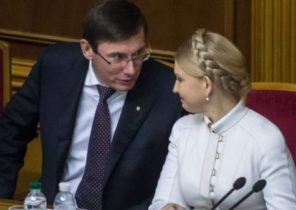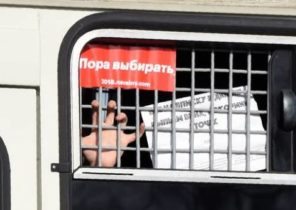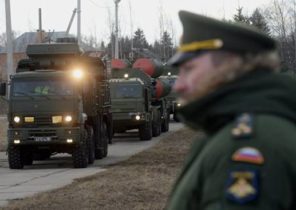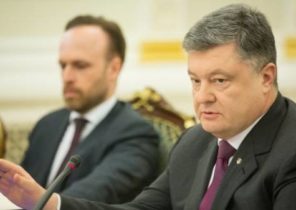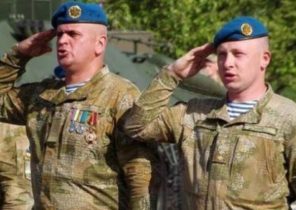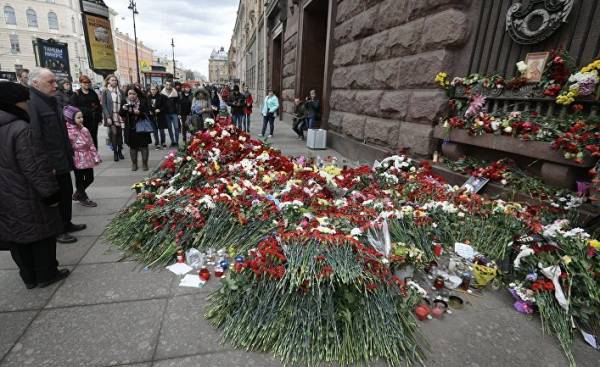
On the afternoon of Monday bomb explosion in the subway killed at least 14 people and wounded dozens more. The official reaction of the Russian authorities initially looked unintelligible. First, the attorney General seems to be confirmed that it was a terrorist attack, then the same thing was repeated by Prime Minister Dmitry Medvedev, however, then President Vladimir Putin, just at this time met in St. Petersburg with Belarusian President Alexander Lukashenko said that the cause of the accident is not yet established. Anyway, criminal case is brought on the attack, although the official version has not yet been announced.
However, for the Kremlin, the state media, it was clear from the beginning. They immediately began non-stop to highlight “attack” by publishing photos of victims of the alleged terrorist, later caught the perpetrator and a witness, the second bomb, which allegedly was discovered and defused. Putin, despite his own recent words, responded to the condolences that brought him the President of the United States Donald trump, special statement. In it the Russian leader stressed that he and trump consider terrorism “an evil that must be fought together.” Russian foreign Minister Sergei Lavrov has added to it the call to strengthen international cooperation in combating terrorism. On the background expected in the coming weeks visit by Secretary Rex Tillerson (Rex Tillerson) in Moscow and the attempts of the Russian government to distract attention from the recently swept the country’s anti-corruption protests it is not surprising that the state media machine (and behind it are government officials) emphasize the importance of cooperation between the United States and Russia in combating terrorism and at the same time the need to tighten security measures in a period of possible instability. The Duma has already suggested in connection with the incident ban “for a while” political demonstrations.
Such behavior of the authorities, of course, be talks in Russia and abroad — that the attack could be a provocation. Rumors of this kind is constantly haunted the Kremlin since, as known to experts in investigative journalism has led strong evidence in favor of the fact that the 1999 bombings in Moscow apartment houses were organized by the Federal security service (FSB) to create a pretext for the second Chechen war that brought Putin to the presidency.
However, the rumors of “special operations” only distract us from the real position of the Kremlin against terrorist organizations and terrorist attacks. However, the real position looks scary enough without any additional embellishment.
After the attacks of 11 September, the Kremlin has repeatedly tried to use a mutual commitment to fighting terrorism as the basis for restoring relations with Washington. He made advances to the administration of George W. Bush, lured into a trap by the Obama administration and is now trying to influence the administration of the tramp, which in principle tend to think the main threat to America is terrorism, not Russia. At the same time Russia is expanding its military and diplomatic presence in the middle East, calling for “stability” — which in her case means the preservation of autocratic regimes in the name of opposition to terror.
However, Russia’s words sharply contradict its actions. The active intervention of Moscow in support of Syrian President Bashar al-Assad is fueling a destabilizing region crisis. Simultaneously, the Kremlin is cooperating with a number of terrorist organizations. In the same Syria — where, as has been noted, the main goal of Kremlin is to keep Assad in power and not to fight with Islamic state (a terrorist organization banned in Russia — approx. transl.), — The Kremlin is using the Lebanese Hezbollah and the Iranian unit “Quds”. Together they supposedly fighting with Islamic state, and both groups are used for ground operations to capture territory and for the leadership of the local militias.
Also documented evidence that Russia and Assad in various ways to help the “Islamic state”. Besides the fact that Assad is buying oil from terrorists, besides the fact that they presumably share intelligence, and in addition constantly funneling them arms and ammunition of Russian stockpiles, FSB, by some accounts, helped them to recruit and facilitate the arrival of jihadists to Syria. Although some argue that it was a “local initiative” for cleaning the North Caucasus ahead of the Olympic games in Sochi, there is information that Russian agents also help conduct similar recruitment in Europe.
This support from the outset, brought to the Kremlin’s benefit. It’s hard not to notice that the first group of Russian-speaking jihadists have appeared in Syria just in time to redirect the war away from Assad, Iraq. They obviously were well informed, acted quickly and coordinated with Abu Bakr al-Baghdadi (Abu Bakr al-Baghdadi) and other Sunni leaders of the “Islamic state”, many of whom were trained in the KGB (the result of long-standing cooperation of the Kremlin with the Baath party in Syria and Iraq). The emergence of the “Islamic state” has strengthened Russia’s version of events, claiming that there are moderate rebels who could be supported against Assad.
There is evidence that Russia has also cooperated with the Taliban (a terrorist organization banned in Russia — approx. transl.). The Russians believe that by supporting the Taliban — giving them legitimacy and providing intelligence information, they limit the expansion of the “Islamic state”. Meanwhile, their actions are contrary to U.S. interests, as American troops continue to fight with the Taliban, and “al-Qaeda” (the terrorist organization banned in Russia — approx. transl.), and with the “Islamic state”.
A signal from the Kremlin seemed obvious: if you want to be a terrorist, be our suicide and act outside the Russian territory.
The Kremlin has weaponized migration. He turned in the weapon information and has created a complex information architecture within the Western media and social networks. He uses this information architecture to turn in the weapon data — for example, using out of context demographic indicators to create useful Moscow narratives. The Kremlin’s ideologues called democracy and terrorism similar forms of extremism. So it is hardly surprising that they use radicalization as another tool of hybrid warfare.
That is why even after the tragedy, calls for cooperation with the Kremlin in the fight against terrorism is not credible. It is hard to imagine how America can combat terrorism with a country that treats terrorist organizations as one of the possible tools for hybrid or conventional — war. Note that the Kremlin had also changed its nuclear doctrine and is now considering nuclear weapons as conventional. Against this background, his constant interaction with terrorist elements demonstrates that it is ready to use in their war with the West by any means.
This set of tools is used to Putin’s Russia could achieve — including by negotiation — desired results. In other words, the Kremlin is convenient to use its status as a “villain” to bargain for his country, is much inferior to the opponents strength, the most favorable conditions. As emphasized many times during the recent Senate hearings on Russia and Russians “are not giants ten feet tall”. But until we’re ready to see the whole set of tools and tactics that they can to use against us, and until we understand how they can use these tools and tactics against their enemies (often unimaginable for us), we will not be able to negotiate with them on equal terms and with open eyes.
Now, when the Russian media began to talk about the terrorist threat, we should be cautious, though without the cynicism relate to the new narrative of terrorism used by the Kremlin.
Administration trump not to succumb to temptation and make combating terrorism a priority area or a key area for the bilateral cooperation with Russia. When talking one-on-one Kremlin skillfully uses unconventional means. He tries to catch the opponents off guard and dominate. Once the parties sit at the negotiating table, usually there are certain surprises — usually in the form of crises that can be solved only with the help of their unconventional methods. However, this approach is more difficult to use when the opponent is ready or when negotiations in a multilateral format. For example, a strong NATO Alliance allows us to deter Russian aggression and to oppose it. The Kremlin is in a relatively weak position when his tricks and excuses cease to operate.
What happened on Monday the attack was a tragedy for the victims. However, it is not a reason to allow you to avoid serious questions about Russia’s cooperation with foreign terrorist organizations and about the many evidence of it inciting anti-Western, anti-American and anti-NATO sentiment. As is often the case, the Kremlin stories about the fight against terror look perfect in a broadcast on Russian television. But Americans need to understand what the realities are behind this myth. Otherwise, the blame for the crimes of the Kremlin will fall, including, and.
